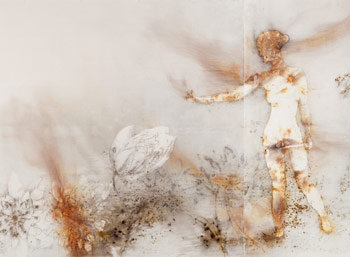Cai Guo-Qiang
dal 19/11/2009 al 20/2/2010
Segnalato da
19/11/2009
Cai Guo-Qiang
Taipei Fine Arts Museum, Taipei
Through the positioning of the installation works in the architectural space, Cai looks back at his works and places them in new contexts, challenging and energizing the museum space in unusual ways. The 35 works on exhibition are drawn from internationally renowned museum and private collections, and include three specially created new works: Day and Night, Chinese landscape Toroko Gorge and Strait.

Internationally acclaimed artist Cai Guo-Qiang was born in Quanzhou City, Fujian Province. He speaks Fukienese and is also a follower of the goddess Mazu; for him, visiting Taiwan "feels like coming home." In 1998, Cai was first invited by the Taipei Fine Arts Museum to realize Golden Missile and Advertising Castle for the 1998 Taipei Biennial. In the same year, he was commissioned to realize the No Destruction, No Construction: Bombing the Taiwan Museum of Art project. In 2004, Cai curated the BMOCA (Bunker Museum of Contemporary Art: Everything is Museum No. 3). After the September 21, 2000 earthquake and August 8, 2009 floods, he donated his works to charity sales, showing his deep affection and friendship for Taiwan.
This is Cai's second collaboration with the Taipei Fine Arts Museum and his first exhibition inside the grand space of the museum. Through the positioning of the installation works in the architectural space, Cai looks back at his works and places them in new contexts, challenging and energizing the museum space in unusual ways. The 35 works on exhibition are drawn from internationally renowned museum and private collections, and include three specially created new works. In this exhibition with the special featuring Cultural Melting Bath (1997), audiences are invited to join the medicinal bath located in the outdoor courtyard. For this exhibition, Cai Guo-Qiang devoted intensive artistic thanking for three new works: Day and Night, a gunpowder drawing based on the physical diary of a female nude; the classical Chinese landscape Toroko Gorge, inspired by Cai's recent visit to the spectacular landscape in eastern Taiwan; and Strait, a Quanzhou rock curved as a cross-section of Taiwan Strait transported in this occasion by sea, literally through the ancient journey from the mainland China.
As a contemporary artist, Cai Guo-Qiang not only dreams audaciously, he is effective doer in realizing his artistic vision. His explosive energy does not stem from gunpowder, but from an unrestrained flow of creative energy, an ability to create social dialogue, and a dogmatic romanticism. This exhibition highlights the artist's background and development, his creative process, and his insistence on and methods of making art more accessible to the general public. To fully embrace the theme of "hanging out in the museum" and to create opportunities where the public can interact with art, a series of activities and programs, such as the public viewing and volunteer training for the creation of several gunpowder drawings in the exhibition, and related education programs have been initiated. The exhibition also seeks to examine Cai Guo-Qiang's creations and the zeitgeist in his art, through contemplating the practice of contemporary art, critiquing socio- and geopolitics, and reflecting on Eastern aesthetics and philosophy.
Forum Speakers: Yuko Hasegawa, David A. Ross, Fei Da-wei, Chia Chi Jason Wang, Chien Hui Kao , Hsiao-hung Chang and Jow-Jiun Gong.
Catalogue: Essays by Chia Chi Jason Wang, Akira Tatehata, Joshua Cooper Ramo, Wu Hung and Yang Chao. Full illustrated, 312pp, published by TFAM
Media Contact: Yang Shun-wen
yangsw@tfam.gov.tw, tel +886 2 2595 7656 ext 106
Opening: Friday 20 November 2009 7 - 9 pm
Forum: Saturday 21 November 2009 10 - 17 pm
Taipei Fine Arts Museum
181 Zhongshan North Road Section 3, Taipei
Hours
Tuesday-Sunday 09:30 to 17:30. Open on national holidays.
Close on Mondays.
Saturday Night from 17:30 to 20:30.
Adult admission: TWD30, Concessions: TWD15



